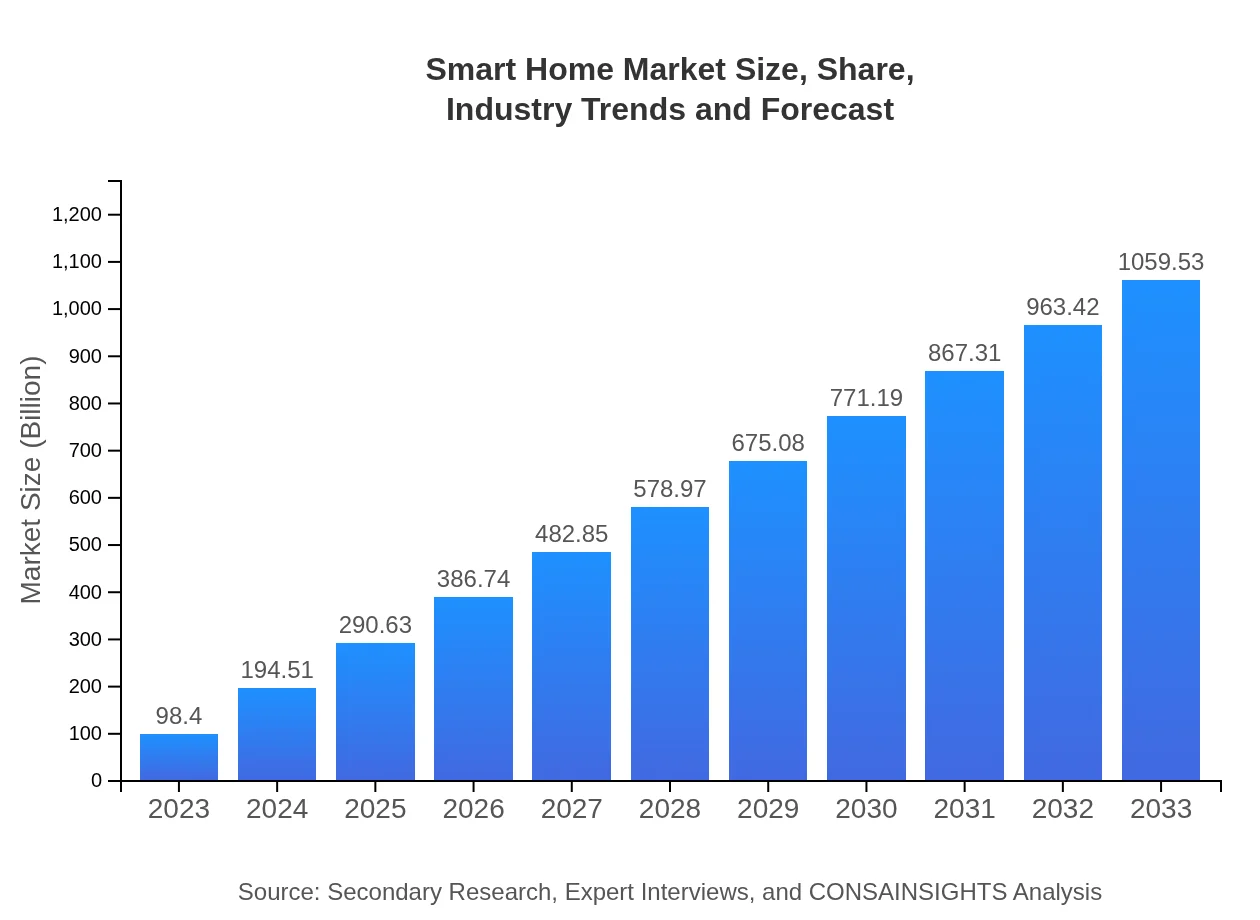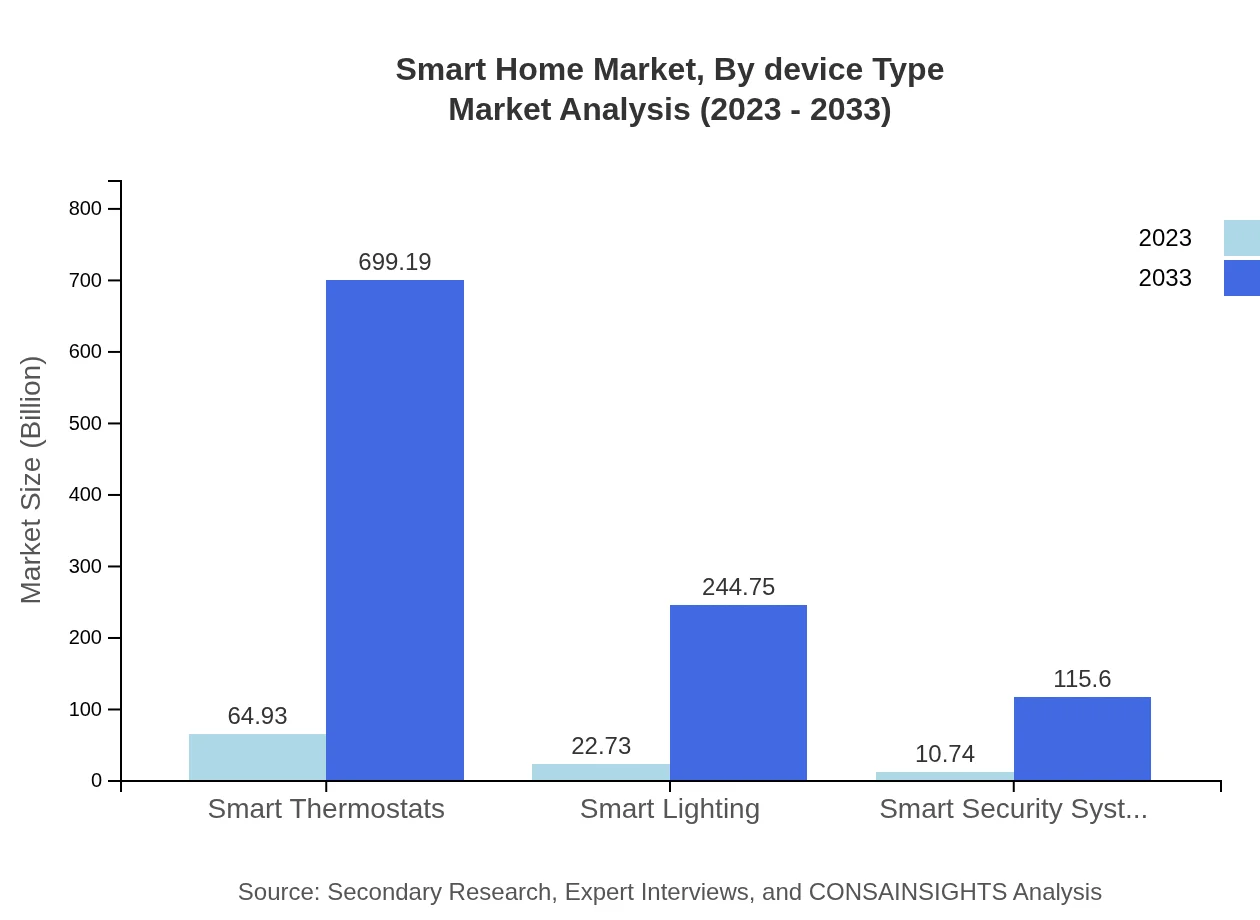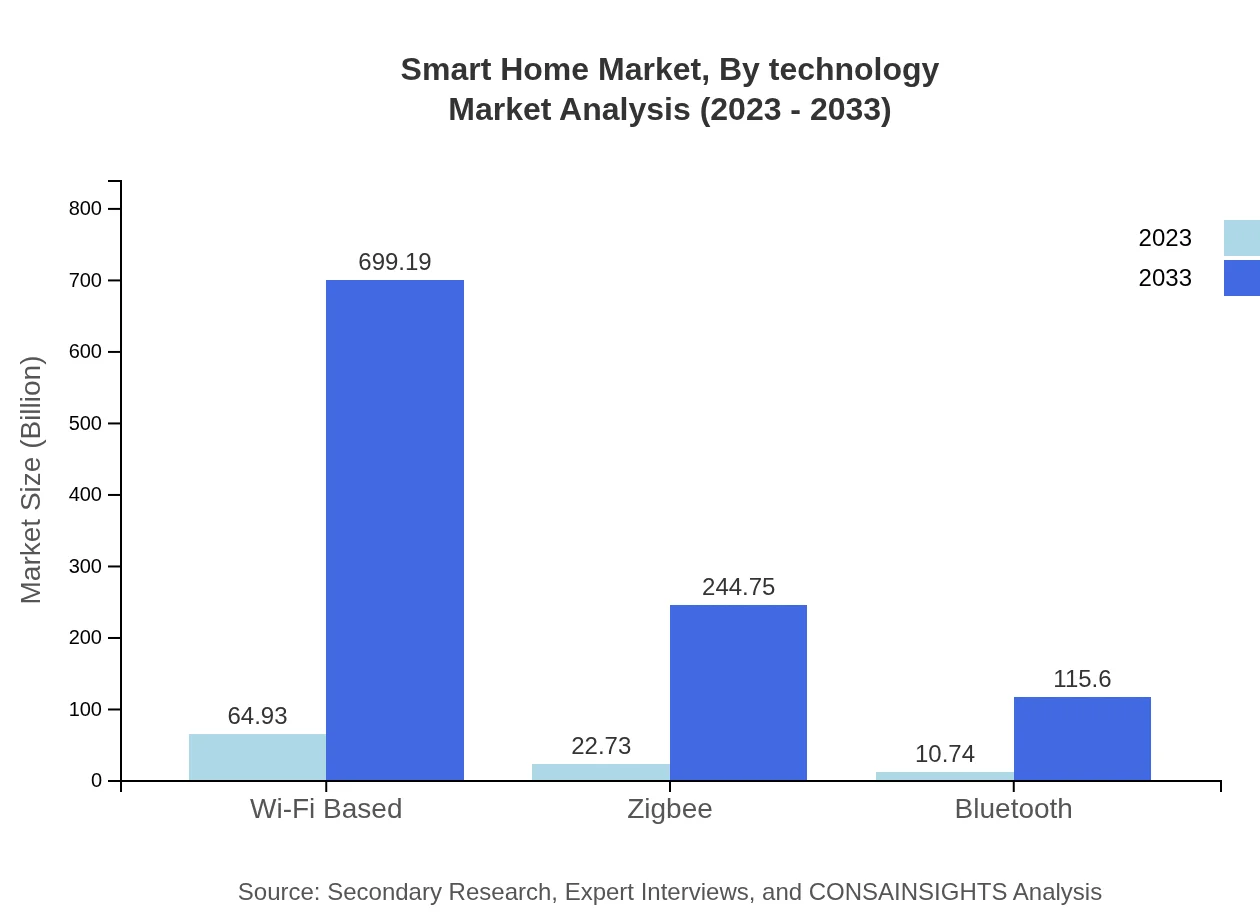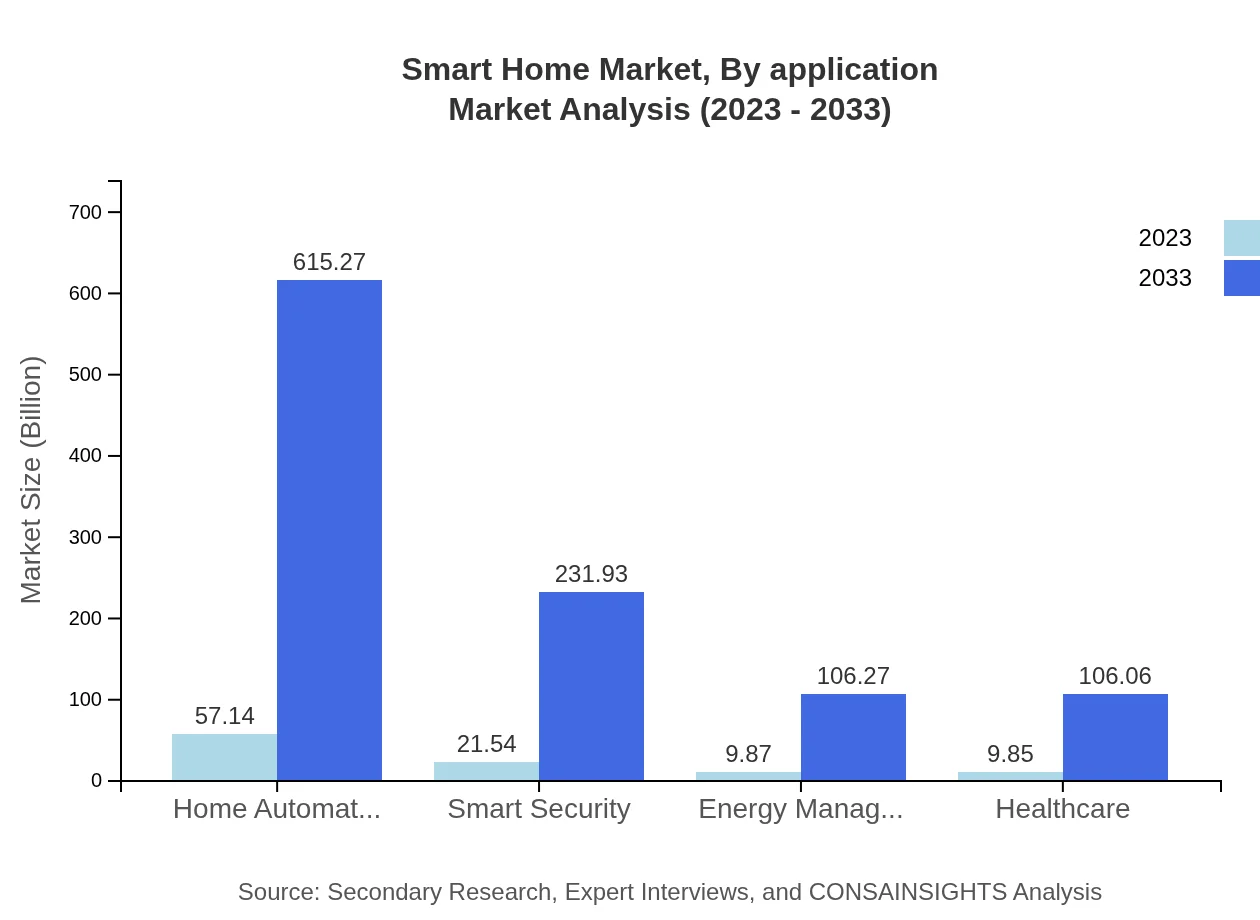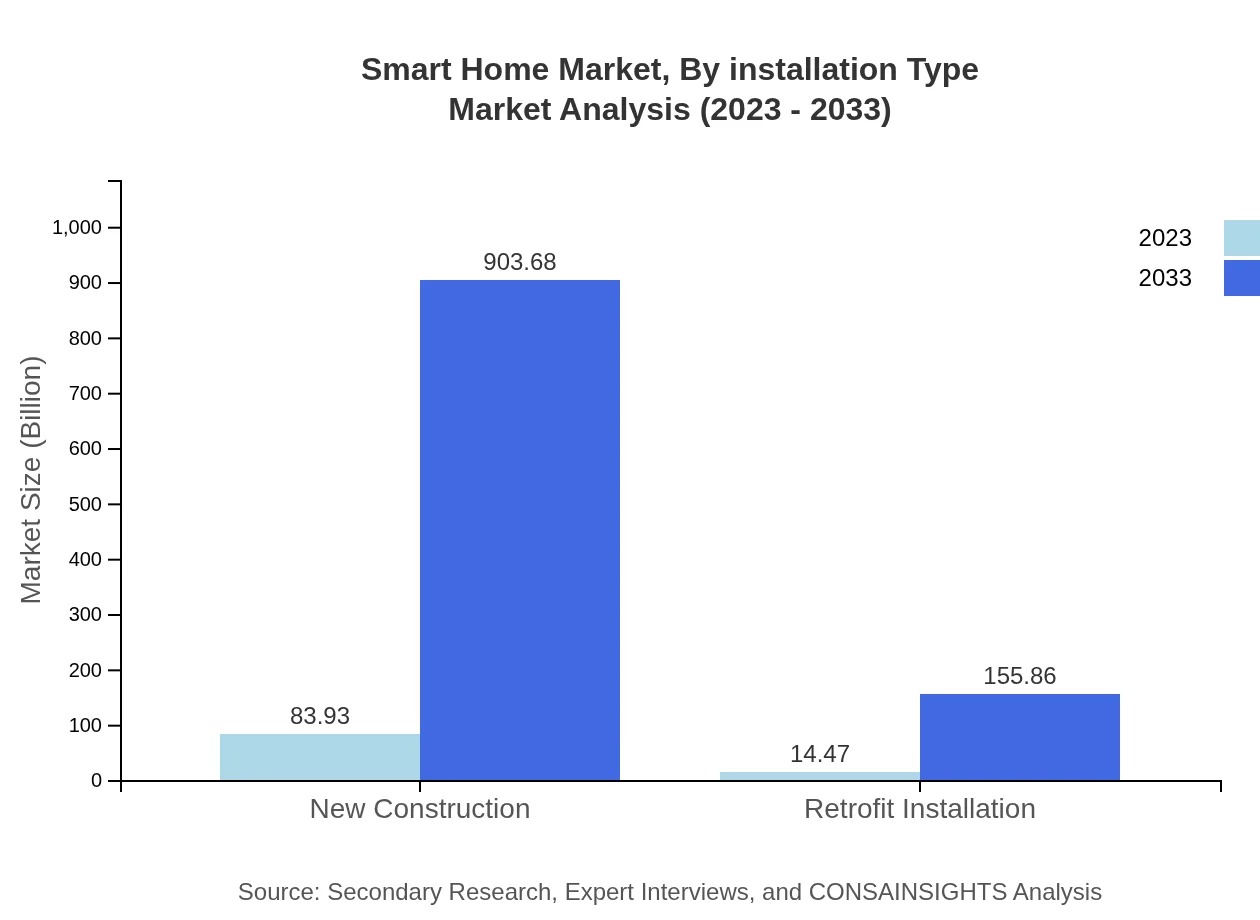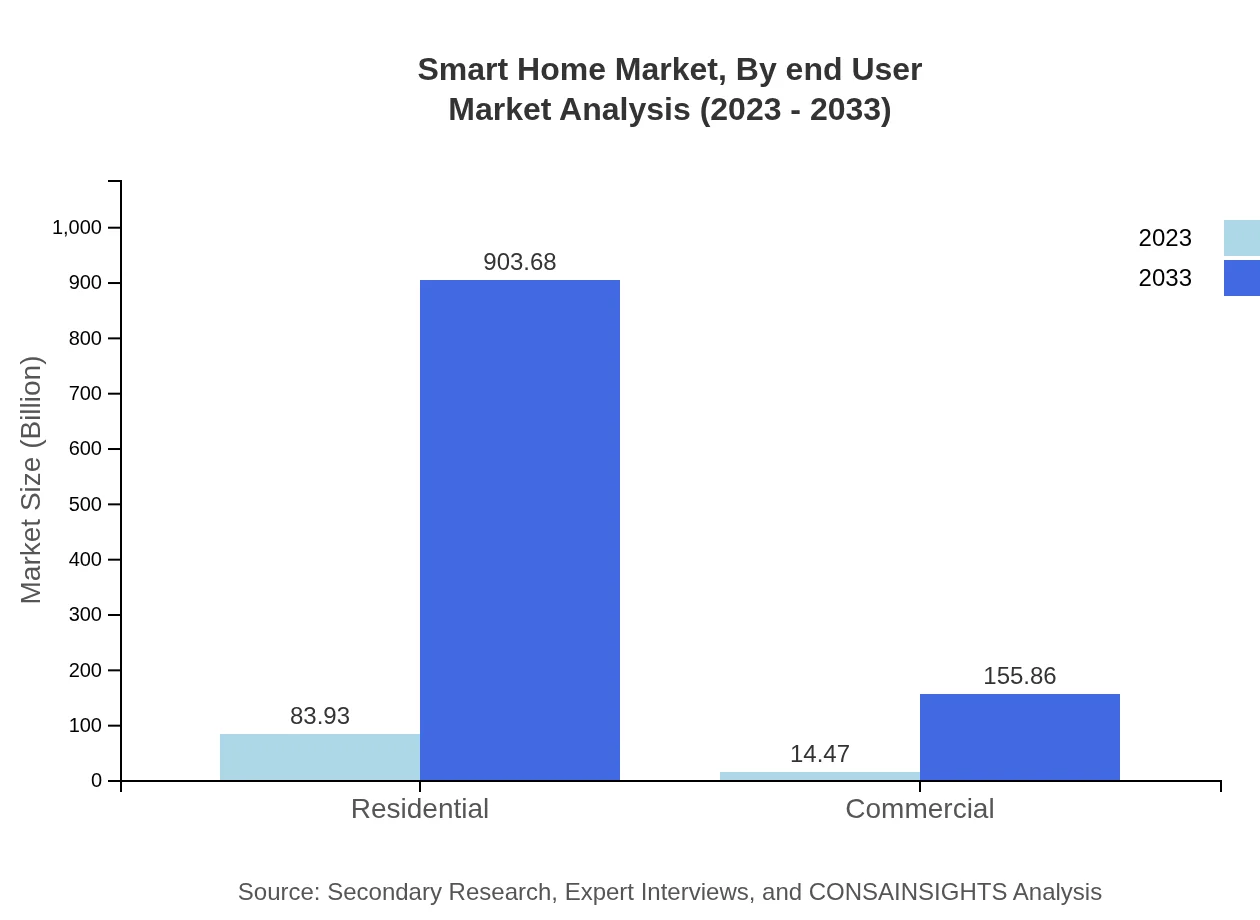Smart Home Market Report
Published Date: 31 January 2026 | Report Code: smart-home
Smart Home Market Size, Share, Industry Trends and Forecast to 2033
This report provides an in-depth analysis of the Smart Home market, focusing on insights, market conditions, and forecasts from 2023 to 2033. Key trends, regional performances, and segment analyses are presented, offering a comprehensive view of the evolving smart home landscape.
| Metric | Value |
|---|---|
| Study Period | 2023 - 2033 |
| 2023 Market Size | $98.40 Billion |
| CAGR (2023-2033) | 25.1% |
| 2033 Market Size | $1059.53 Billion |
| Top Companies | Amazon , Google, Samsung , Philips, Apple |
| Last Modified Date | 31 January 2026 |
Smart Home Market Overview
Customize Smart Home Market Report market research report
- ✔ Get in-depth analysis of Smart Home market size, growth, and forecasts.
- ✔ Understand Smart Home's regional dynamics and industry-specific trends.
- ✔ Identify potential applications, end-user demand, and growth segments in Smart Home
What is the Market Size & CAGR of Smart Home market in 2023?
Smart Home Industry Analysis
Smart Home Market Segmentation and Scope
Tell us your focus area and get a customized research report.
Smart Home Market Analysis Report by Region
Europe Smart Home Market Report:
In Europe, the market size for Smart Homes is forecasted to increase from $31.32 billion in 2023 to approximately $337.25 billion by 2033. Stringent regulations on energy efficiency and a higher rate of technology adoption contribute to this significant expansion.Asia Pacific Smart Home Market Report:
In the Asia Pacific region, the Smart Home market is expected to grow from $16.28 billion in 2023 to approximately $175.25 billion by 2033. Factors driving this growth include rising urbanization, increasing adoption of IoT technologies, and growing awareness of home security and automation benefits.North America Smart Home Market Report:
North America holds a significant share of the Smart Home market, valued at $36.23 billion in 2023 and projected to reach roughly $390.12 billion by 2033. High consumer readiness for technology adoption coupled with extensive investment in advanced home security systems are key growth drivers.South America Smart Home Market Report:
The Smart Home market in South America is anticipated to grow from $3.59 billion in 2023 to around $38.67 billion by 2033. The growth is spurred by improving internet connectivity and a rising middle class, which drives demand for smarter living solutions.Middle East & Africa Smart Home Market Report:
The Middle East and Africa market is expected to grow from $10.98 billion in 2023 to around $118.24 billion by 2033. Factors such as increasing real estate developments and a greater focus on home security are key contributors to this growth.Tell us your focus area and get a customized research report.
Smart Home Market Analysis By Device Type
The residential segment dominates the Smart Home market, recording a value of approximately $83.93 billion in 2023 and forecasted to reach $903.68 billion by 2033. The commercial segment, while smaller, is also expected to grow from $14.47 billion in 2023 to about $155.86 billion by 2033.
Smart Home Market Analysis By Technology
Wi-Fi based systems lead with an estimated market size of $64.93 billion in 2023, set to rise to $699.19 billion by 2033. Zigbee systems currently stand at $22.73 billion, expected to grow to $244.75 billion. Bluetooth technology is positioned at $10.74 billion and is projected at $115.60 billion by 2033.
Smart Home Market Analysis By Application
The Home Automation segment is significant, starting at $57.14 billion in 2023 and projected to reach $615.27 billion by 2033. Other notable applications include Smart Security with a current market valuation of $21.54 billion growing to $231.93 billion.
Smart Home Market Analysis By Installation Type
New Construction installations feature prominently in the market, valued at $83.93 billion in 2023 and projected to grow to $903.68 billion by 2033. Retrofit options show considerable growth as well, moving from $14.47 billion in 2023 to around $155.86 billion by the end of the forecast period.
Smart Home Market Analysis By End User
End-users primarily include residential homeowners, which dominate the sector. The increasing focus among consumers on home efficiency and personalized smart services further strengthens this segment.
Smart Home Market Trends and Future Forecast
Tell us your focus area and get a customized research report.
Global Market Leaders and Top Companies in Smart Home Industry
Amazon :
Amazon leads in the smart home space with its Echo devices integrated with Alexa, facilitating hands-free control of an extensive range of smart devices.Google:
Google's Nest platform offers a variety of smart devices and services, including thermostats, cameras, and home security solutions, contributing to its strong market presence.Samsung :
Samsung SmartThings platform allows users to connect and control their smart home devices easily, positioning the company as a key player in the market.Philips:
Philips leads in smart lighting solutions with its Hue product line, enabling dynamic control and energy-efficient lighting options for smart homes.Apple :
Apple's HomeKit allows for easy integration of smart home devices, enhancing user convenience through Apple devices, contributing significantly to market growth.We're grateful to work with incredible clients.









FAQs
What is the market size of smart Home?
The smart home market is projected to grow from $98.4 billion in 2023 to an estimated value reflecting a CAGR of 25.1% through 2033. This rapid growth indicates increasing adoption of smart technologies across homes.
What are the key market players or companies in the smart Home industry?
Key market players in the smart home industry include significant technology firms focusing on IoT devices, home automation solutions, and security systems. Companies like Google, Amazon, and Samsung play pivotal roles in shaping market innovations.
What are the primary factors driving growth in the smart home industry?
Factors driving the growth in the smart home industry include technological advancements in IoT, increased consumer awareness, and the rising need for energy efficiency and automation in daily living. These elements are reshaping home environments.
Which region is the fastest Growing in the smart home market?
The Asia Pacific region is recognized as the fastest-growing area in the smart home market, with projections indicating market growth from $16.28 billion in 2023 to $175.25 billion by 2033, indicating robust adoption.
Does ConsaInsights provide customized market report data for the smart home industry?
Yes, ConsaInsights offers customized market report data tailored to specific needs in the smart home industry, allowing clients to access relevant insights and trends that cater to their unique requirements and interests.
What deliverables can I expect from this smart home market research project?
From this smart home market research project, clients can expect detailed reports including market size, trends analysis, regional insights, competitive landscape assessments, and projections for future growth tailored to stakeholder needs.
What are the market trends of smart home?
Emerging trends in the smart home market include increased integration of AI for enhanced functionality, greater focus on energy management solutions, and the development of advanced smart security systems, reflecting evolving consumer needs.

